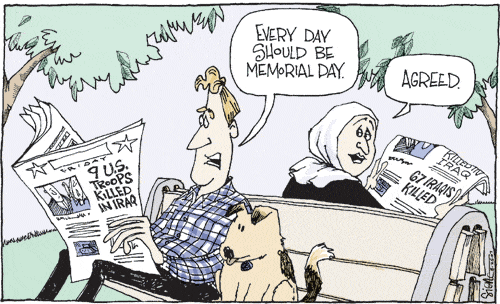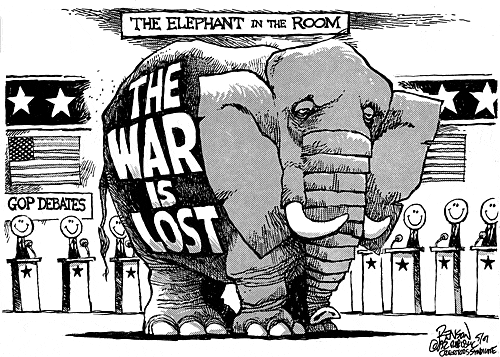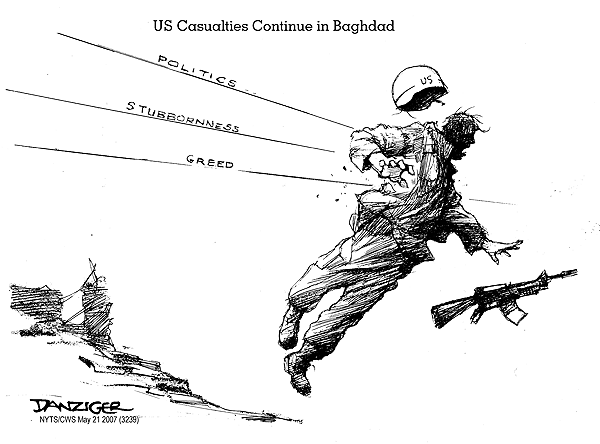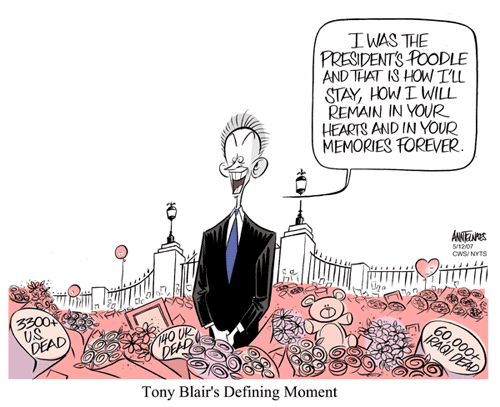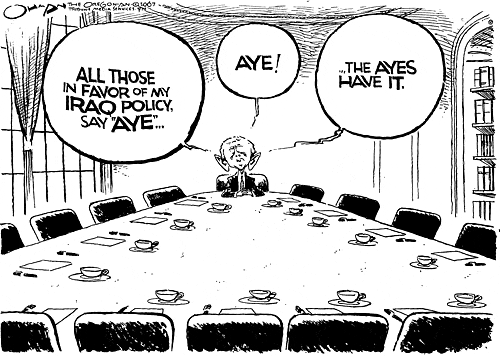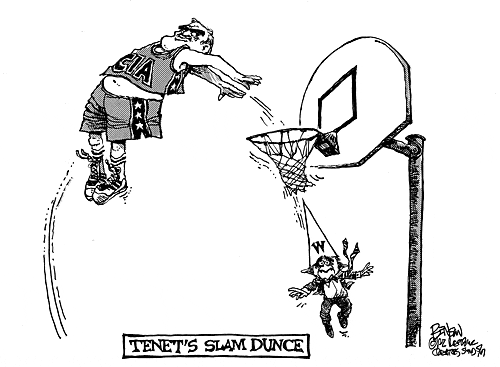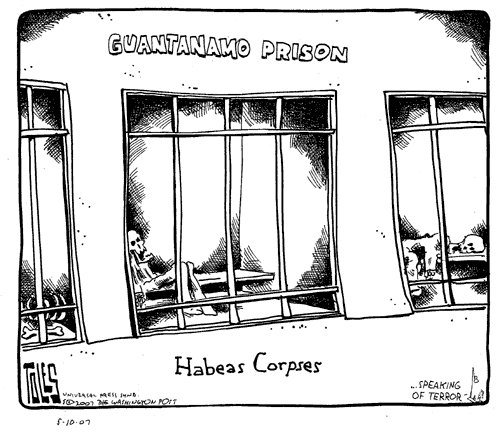BAGHDAD, May 24 — The growing confrontation between tribal leaders in Anbar Province and Al Qaeda took a violent turn on Thursday when a suicide bomber drove into a crowd gathering for a funeral procession in the volatile city of Falluja, killing at least 27 people and wounding dozens of others.
The attack followed a pattern of two-stage assaults that has been replicated often in the four-year war. At breakfast time, masked gunmen assassinated a prominent Sunni tribal leader, Allawi al-Issawi, who had joined others across Anbar in opposing terrorist groups linked to Al Qaeda. Less than three hours later, as mourners gathered for a funeral procession outside his home, the suicide bomber struck.
The tribal leaders' campaign has helped make Anbar one of the few bright spots in Iraq for the Americans. With many of the Sunni sheiks calling on their followers to join the Iraqi Army and the police, and declaring Al Qaeda a common enemy of Iraqi Sunnis, levels of violence across much of Anbar have dropped sharply, especially in the capital, Ramadi, and in towns along the Euphrates.
But the area around Falluja, 30 miles west of Baghdad, has seen a violent struggle between tribal leaders eager to follow the lead set in Ramadi and other tribal groups that continue to back Al Qaeda in what American commanders call the "Baghdad belts," predominantly Sunni areas like Falluja that straddle the approaches to the capital.
The Falluja attack occurred on another day of widespread violence, much of it apparently committed by Sunni insurgent groups.
Gunmen who set up a fake checkpoint at Hussainiya, on the northeastern outskirts of Baghdad, stopped a minibus and raked the Shiite passengers with gunfire, killing 11, including several women and children. The police said the attackers then left a bomb in the wreckage that exploded as rescuers arrived, killing two civilians.
Car bombings, suicide attacks, mortar volleys and ambushes killed at least 50 others. They included six Iraqi policemen who died in a roadside bombing in Suleiman Beg, about 60 miles south of Kirkuk in an area of mixed Sunni Arab, Kurdish and Turkmen population.
The police in Baghdad said they found 22 bodies on Wednesday, bringing the number of unidentified bodies in the capital, many bearing signs of torture, to more than 340 this month.
American commanders have cited lower levels of sectarian killings as a tentative early sign of success in President Bush's "surge" strategy, under which nearly 30,000 additional American troops have been committed, with the last of them now preparing to deploy in Baghdad and other hot spots, like Diyala. But the commanders have conceded that a lower rate of sectarian killing has been offset by an unabated tempo of suicide bombings, the attacks that claim the largest number of civilians.
The American military command said that two American soldiers were killed Wednesday during combat operations in Anbar Province, increasing an American military death toll that has risen above 80 this month, one of the deadliest in the war.
American commanders have said they expect American casualties to rise as the summer progresses and the troop increase reaches its peak. More than 150,000 troops are now deployed here, close to the highest level at any stage since the 2003 invasion.
At least five of the American combat deaths this month resulted from a May 12 ambush in which three soldiers were abducted. The American command confirmed Thursday that a body found in the Euphrates on Wednesday near Musayyib, in a Qaeda stronghold about 45 miles south of Baghdad, was that of Pfc. Joseph J. Anzack Jr., 20, of Torrance, Calif. The search for the two other missing soldiers — Specialist Alex R. Jimenez, 25, of Lawrence, Mass., and Pvt. Byron W. Fouty, 19, of Waterford, Mich. — continued.
Among the thousands of United States troops involved in the hunt, the recovery of Private Anzack's body was greeted with a mixture of sadness and relief. "It's good to have the finality of it," said Lt. Michael Nunziato, 24, of Buffalo, a member of the Second Brigade Combat Team of the 210th Mountain Division, which lost a soldier in a bomb explosion on Saturday during the search for the missing men.
Lieutenant Nunziato added, referring to Private Anzack: "You never want it to be that he passed away, but you have to keep up hope for the remaining two. You have to keep up hope."
In Baghdad on Thursday, Prime Minister Nuri Kamal al-Maliki named replacements for six cabinet ministers who quit last month on the orders of the radical Shiite cleric Moktada al-Sadr. At the time, Mr. Sadr said he was taking the action to protest Mr. Maliki's refusal to back a timeline for the departure of American forces. But the cleric may also have wanted to distance himself from the increasingly unpopular Maliki administration, which completed its first year in office this week with scant progress in curbing violence or improving Iraq's devastated public services.
Officials in Mr. Maliki's office described his nominees as technocrats who would bring new levels of efficiency to the ministries, which included the politically delicate portfolios of agriculture, health and transport.
But Mr. Maliki also voiced some of his strongest opposition yet to pressure for his government to meet political "benchmarks" on bitterly contested issues like the division of oil revenues. "How can the head of an elected government accept another country imposing restrictions or conditions on its actions?" he said Wednesday in a television interview.
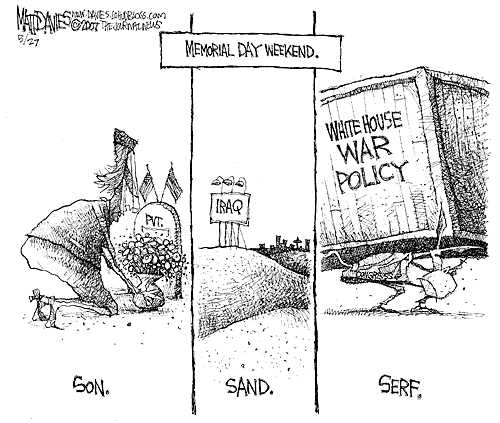
![[A B]](http://online.wsj.com/public/resources/images/HC-GK071_Bacevi_20070525163651.gif)
![[Andrew Bacevich, Jr.]](http://online.wsj.com/public/resources/images/HC-GK072_Bacevi_20070525163805.gif)
